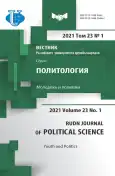Social Capital of Youth in a Modern City: Opportunities for Empirical Research
- Авторлар: Shentyakova A.V.1
-
Мекемелер:
- Saint Petersburg State University
- Шығарылым: Том 23, № 1 (2021): Youth and Politics
- Беттер: 130-140
- Бөлім: YOUTH: SOCIAL AND POLITICAL CAPITAL
- URL: https://journal-vniispk.ru/2313-1438/article/view/322137
- DOI: https://doi.org/10.22363/2313-1438-2021-23-1-130-140
- ID: 322137
Дәйексөз келтіру
Толық мәтін
Аннотация
Modern megalopolis concentrates all groups of resources including economic, political, cultural, information, human resources, etc. The high population density, economic and geographic situation, complex multiethnic and multicultural structure of large cities contribute to certain types of values and behavioral models in the younger generation. The neo-institutional approach and social capital theory were chosen as a methodological basis. The article examines a number of methodological works devoted to various aspects of the social capital and explores the opportunity for this concept application for analysis of the protest behavior motivation and assessment of the protest potential of young people. Combination of the economic model of multilevel analysis for measuring social capital by S.А. Sysoev and socio-political parameters for the empirical part allowed to clearly defining the main categories and indicators of analysis. Measuring the levels of social capital of a megalopolis with the inclusion a network component expands the range of opportunities for assessing and identifying the protest potential of large Russian cities residents.
Негізгі сөздер
Авторлар туралы
Anna Shentyakova
Saint Petersburg State University
Хат алмасуға жауапты Автор.
Email: a.shentyakova@spbu.ru
PhD in Political Science, Assistant of the Department of Political Institutions and Applied Political Studies
Saint Petersburg, Russian FederationӘдебиет тізімі
- Afanasyev, D. V., Guzhavina, T. A., & Mekhova, A. A. (2016). Social capital in a region: Revisiting the measurement and building of an indicator model. Economic and Social Changes: Facts, Trends, Forecast, 6: 110–125. (In Russian).
- Akhremenko, A. S., Stukal, D. K., & Petrov, A. P. (2020). Network vs message in protest diffusion on social media: Theoretical and data analytics perspectives. Polis. Political Studies, 2: 73–91. (In Russian).
- Akhtarieva, L. G., & Kharichkova, L. I. (2016). Current trends in the development of Russian megalopolises. Fundamental Research, 7: 56–57. (In Russian).
- Bourdieu, P. (2002). Forms of capital. Economic Sociology: E – Journal, 3–5: 60–74. (In Russian).
- Bourdieu, P. (2004). Forms of capital. Moscow: ROSSPEN. 680 p. (In Russian).
- Coleman, J. (2001). Social and human capital. Social Sciences and Contemporary World. 3: 122–139. (In Russian).
- Di Maggio, P. (1982). Cultural capital and school success: The impact of status culture participation on the grades of U.S. high school students. American Sociological Review, 47: 189–201.
- Franz, V. A. (2020). “Soft power” of the culture of political protest: Theoretical and methodological foundations of the study. Philosophy and Humanities in Information Society, 2: 92–101. (In Russian).
- Fukuyama, F. (2002). Social capital. Culture matters. How values contribute to social progress. Ed. by L. Harrison and S. Huntington. Moscow.: Moscow school of political research. 320 p. (In Russian).
- Khaikin, M. M., & Krutik, A. B. (2014). Social capital and social networks. Bulletin of the South Ural State University. Series Economics and Management, 1: 85–92. (In Russian).
- Levanova, E. A., Mudrik, A. V., Pushkareva, T. V., & Seryakova, S. B. (2019). Megapolis as a socio-cultural and socio-pedagogical phenomenon. Siberian Pedagogical Journal, 5: 7–14. (In Russian).
- Maksimov, S. N., & Semenenko, V. V. (2012). Peculiarities and problems of the development of contemporary megalopolises. Problems of Modern Economics, 2: 352–355. (In Russian).
- Maskell, P. (2000). Social capital, innovation and competitiveness. Social Capital, Critical Perspectives. S. Baron, J. Field, T. Schuller (Eds.), Oxford: Oxford University Press. 111–123.
- Naydenova, L. I., & Fedotov, L. N. (2009). Non-economic capital and its implications for regional social development. The Journal of Sociology and Social Anthropology,12(2): 84–95. (In Russian).
- Parshina, V. V. (2015). Youth as a special socio-demographic group in the social structure of society. Actual Problems of Humanities and Natural Sciences, 10(5): 114–117. (In Russian).
- Putnam, R. (1996). Making democracy work: Civic traditions in modem Italy. Moscow: Ad Marginem. 287 p. (In Russian).
- Seredina, M. I. (2011). Social problems of contemporary world’s megalopolises. SERVICE PLUS, 1: 23–27. (In Russian).
- Stolbov, V. P. (2016). About social capital in urban environment. Proceedings of the Universities. Series Economics, Finance and Production Management, 4(30): 71–72. (In Russian).
- Vlasov, F. B., & Stebakov, A. A. (2016). Types and contradictions of social capital. Society and economy, 10: 20–21. (In Russian).
- Zakharov, A. (2018). Criticism of the concept of “Social capital” (translated from English by A. Zakharov). Emergency Reserve; 3: 211–220. (In Russian).
Қосымша файлдар









